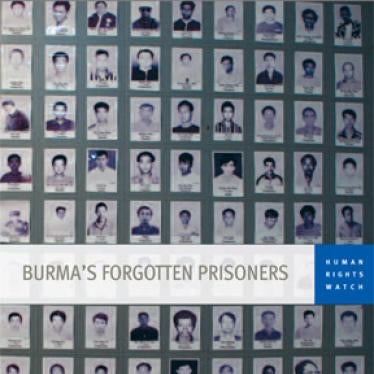(New York) - US Secretary of State Hillary Clinton should publicly call for the release of imprisoned Burmese rights activist and US citizen Kyaw Zaw Lwin, currently on trial in Burma on politically motivated charges, Human Rights Watch said today. Zaw Lwin is in poor health partly due to a hunger strike begun on December 4 to protest the conditions of political prisoners in Burma.
Since the US unveiled its new Burma policy, touted as "pragmatic engagement," in September, there has been no progress towards political reconciliation between the Burmese military government and the democratic opposition, and few if any political prisoners have been released. Two senior State Department officials, Kurt Campbell and Scot Marciel, visited the country in November. However, no senior US official has yet called publicly for Zaw Lwin's release.
"Burma's continued detention of a US citizen doesn't bode well for the new US policy," said Elaine Pearson, deputy Asia director at Human Rights Watch. "The Obama administration should call loudly for Zaw Lwin's immediate and unconditional release."
A congressional letter sent this week has been signed by a bipartisan group of 53 members of the US House of Representatives. The letter urges Burma's leader Than Shwe to immediately release Zaw Lwin.
Zaw Lwin, age 40, also known as Nyi Nyi Aung, had been working for the Free Burmese Political Prisoners Now campaign in Thailand. His mother and two cousins are serving lengthy prison terms in Burma for participating in the peaceful demonstrations in 2007.
Burmese authorities arrested Zaw Lwin at Rangoon International Airport on September 3. He was initially accused of national security violations, but was later charged with holding a forged Burmese national identity card, despite being the holder of a US passport. He is also charged with failing to declare foreign currency at customs, although authorities arrested him before he passed through customs.
Zaw Lwin had regular consular access by US embassy officials. This stopped once Zaw Lwin started his hunger strike on December 4. He was last granted consular access on December 3, despite repeated requests from the US embassy to visit him. Under the Vienna Convention on Consular Relations, "consular officers shall have the right to visit a national of the sending State who is in prison, custody or detention, to converse and correspond with him and to arrange for his legal representation."
Human Rights Watch has long reported on egregiously unfair trials in Burma. Zaw Lwin's trial in Insein prison in Rangoon has been closed to the public, though a US consular representative has been permitted to attend. On December 11, the court postponed proceedings due to "health reasons."
Human Rights Watch expressed concern that the US government has been silent on the Zaw Lwin case, after having spoken out publicly about John Yettaw, the American who swam to democracy leader Aung San Suu Kyi's residence earlier this year. As a result of Yettaw's actions, he, Suu Kyi, and her two housemaids were all jailed and faced criminal charges. Suu Kyi was convicted and sentenced to 3 years in prison, though Burma's leader Than Shwe later commuted the sentence to 18 months under house arrest. In August, Clinton said, "We also call for the release of more than 2,000 political prisoners, including the American, John Yettaw."
In late August, US Senator James Webb secured the release of Yettaw during a visit to Burma in which he met with senior military leaders and Suu Kyi. While Webb has called for consular access to Zaw Lwin, he has stopped short of calling for his immediate release.
"It makes no sense for senior US officials to speak up for somebody who landed Suu Kyi in prison, while staying silent about the arrest of a committed human rights activist like Zaw Lwin," said Pearson.
Zaw Lwin is a former Maryland resident who obtained refugee status in the US in 1993. His fiancée, Wawa Kyaw still lives in Maryland. On November 10, US Senator Barbara Mikulski of Maryland wrote a letter to Clinton, calling for her personal intervention in Zaw Lwin's case. Mikulski wrote, "I urge you to condemn Mr. Lwin's detention in the strongest terms possible and to ensure that the State Department is doing everything in its power to secure Mr. Lwin's release."
Human Rights Watch also called on the United Nations to do more for Zaw Lwin's release. In June 2009, Zaw Lwin travelled from Thailand to New York to deliver a petition of some 680,000 signatures to the UN Secretary-General's Special Adviser on Burma, Ibrahim Gambari. The petition called on UN Secretary-General Ban Ki-moon to exert pressure for the release of more than 2000 political prisoners.
"It is a cruel irony, that someone who met senior UN officials to urge the release of political prisoners is now in prison himself," said Pearson. "The UN should recognize that Zaw Lwin's meeting with Gambari could be what landed him in prison, and Ban Ki-moon should be speaking out for Zaw Lwin's release."
Human Rights Watch said that over the past two years, the number of political prisoners in Burma has doubled. Burmese political prisoners include people from all walks of life such as comedian Zargana, former student leader Min Ko Naing, female labor activist Su Su Nway, and Buddhist monk U Gambira. While democracy leader Aung San Suu Kyi is a worldwide symbol of the struggle against repression, at least 2,100 other political prisoners currently languish in Burma's squalid prisons.
Since September, arrests of political activists, journalists, and Buddhist monks have continued, with authorities arresting and detaining an estimated 50 people throughout the country. Secret trials of activists continue, in many cases their lawyers are harassed and in some cases imprisoned themselves.







